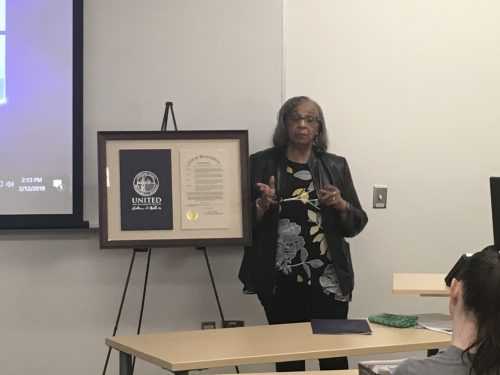This content was published: March 29, 2018. Phone numbers, email addresses, and other information may have changed.
Civil Rights hero Sandra Eastland shares stories of protests, jail and nonviolence
Photos and story by Abe Proctor
The news lately has been filled with images of young people marching to put an end to school shootings in the United States. Their passion, their intensity, is obvious to anyone who is paying attention – much like another group of young people not so very long ago.
Sandra Eastland was one such young person. In May of 1963, she was one of a group of children – the “Children’s Crusade” – who were arrested and temporarily jailed for having the temerity to march in support of equal rights in Birmingham, Ala. Eastland recalled her experiences recently before a group of students, faculty, and staff at Portland Community College’s Cascade Campus.

Eastland recalled that while the Civil Rights Movement was in full swing, she and her fellow young people were kept on the sidelines due to the Rev. Dr. Martin Luther King’s wish that no children should risk possible imprisonment.
Eastland and dozens of other young students were arrested on May 2, 1963, for “parading without a permit” while protesting in support of civil rights. She and her compatriots were jailed for five days, for which she recently received an official pardon from the Birmingham City Council and the State of Alabama. At the gathering, students from the Criminal Justice Club presented her with a carved wooden frame in which to display the pardon documents.
Eastland recalled that while the Civil Rights Movement was in full swing, she and her fellow young people were kept on the sidelines due to the Rev. Dr. Martin Luther King’s wish that no children should risk possible imprisonment. Undaunted, the students persisted until Dr. King relented and allowed them to demonstrate – but not until they had undergone training in the philosophy and techniques of nonviolent resistance.
“I wonder if the young people marching today have that same commitment to nonviolence,” she said. “I hope they do, because we owed everything we achieved to nonviolence. You must remain peaceful. You cannot give the authorities any excuse to crack down on you.”
Eastland said that when she and her fellow students were arrested, the police initially had no place to put them. Birmingham’s city jails were full to bursting with adult protesters, and city officials were conscious of the bad press they might receive for imprisoning children. So, they were loaded into paddy wagons and spent their first night of captivity at the nearby fairgrounds. The next day, they were loaded on to buses and taken to the county jail, where they spent the next four nights.
And what was being in jail like for them?
“We sang!” she recalled, laughing. “Some of the kids were scared, but we knew we were doing the right thing. So we spent a lot of our time behind bars singing.”
